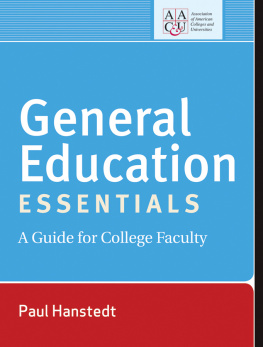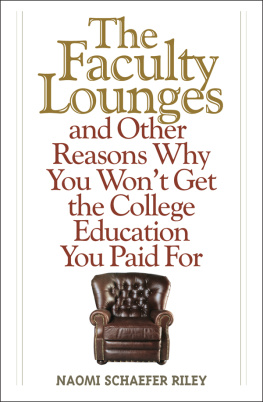THE FALL OF THE FACULTY
The Fall of
the Faculty
The Rise of the
All-Administrative University
and Why It Matters
Benjamin Ginsberg


Oxford University Press, Inc., publishes works that further
Oxford Universitys objective of excellence
in research, scholarship, and education.
Oxford New York
Auckland Cape Town Dar es Salaam Hong Kong Karachi
Kuala Lumpur Madrid Melbourne Mexico City Nairobi
New Delhi Shanghai Taipei Toronto
With offices in
Argentina Austria Brazil Chile Czech Republic France Greece
Guatemala Hungary Italy Japan Poland Portugal Singapore
South Korea Switzerland Thailand Turkey Ukraine Vietnam
Copyright 2011 by Oxford University Press, Inc.
Published by Oxford University Press, Inc.
198 Madison Avenue, New York, NY 10016
www.oup.com
Oxford is a registered trademark of Oxford University Press
All rights reserved. No part of this publication may be reproduced,
stored in a retrieval system, or transmitted, in any form or by any means,
electronic, mechanical, photocopying, recording, or otherwise,
without the prior permission of Oxford University Press.
Library of Congress Cataloging-in-Publication Data
Ginsberg, Benjamin.
The fall of the faculty : the rise of the all-administrative university
and why it matters / Benjamin Ginsberg.
p. cm.
Includes bibliographical references and index.
ISBN 978-0-19-978244-4 (hardback : alk. paper)
1. Universities and collegesUnited StatesAdministration.
2. Organizational behaviorUnited States. 3. Education, HigherAims and
objectivesUnited States. 4. Education, HigherSocial aspectsUnited States.
5. Academic freedomUnited States. I. Title.
LB2341.G496 2011
378.1010973dc22 2010049033
1 3 5 7 9 8 6 4 2
Printed in the United States of America
on acid-free paper
To Sandy
Contents
Preface
I BEGAN MY ACADEMIC career in 1968 as a graduate student at the University of Chicago, joined the Cornell faculty in 1973 as an assistant professor of government, and moved in 1992 to Johns Hopkins, where I was appointed and remain the David Bernstein Professor in the Department of Political Science. I have always felt fortunate to be associated with great universities where I have been surrounded by excellent colleagues and interesting students. Hence, I was saddened to learn from a recently published study that my own university ranks fourth in the nation in terms of the expansion of administrative and support personnel between 1997 and 2007. This finding, unfortunately, coincides with the personal observations that were among the factors prompting me to write this book.
My book sounds a warning and offers a prescription designed to slow if not halt the spread of administrative blight. The prescribed medication will come too late for some victims, but others may yet recover. That, at least, is my hope.
In writing this book I profited greatly from conversations with a number of my Hopkins colleagues, particularly Matthew A. Crenson and Robert Kargon. I am very grateful to my colleague Steve Teles for recommending the book to Oxford University Press and to the readers commissioned by Oxford for their many excellent suggestions. David McBride has been an outstanding editor. I must also thank the many colleagues at schools around the nation who shared their stories with me.
One caveat is very much in order. As I wrote the book, I thought about several administrators with whom I work at Hopkins who are intelligent, talented, and dedicated individuals. I wish all university administrators were like them. Sarah and Judythis book is not about you.
Benjamin Ginsberg
Potomac, Maryland
June 2010
THE FALL OF THE FACULTY
The Growth of
Administration
DURING MY NEARLY five decades in the academic world, the character of the university has changed, and not entirely for the better. As recently as the 1960s and 1970s, Americas universities were heavily influenced, if not completely driven, by faculty ideas and concerns. Today, institutions of higher education are mainly controlled by administrators and staffers who make the rules and set more and more of the priorities of academic life.
Of course, universities have always employed administrators. When I was a graduate student in the 1960s and a young professor in the 1970s, though, top administrators were generally drawn from the faculty, and even midlevel managerial tasks were directed by faculty members. These moonlighting academics typically occupied administrative slots on a part-time or temporary basis and planned in due course to return to full-time teaching and research. Because so much of the management of the university was in the hands of professors, presidents and provosts could do little without faculty support and could seldom afford to ignore the facultys views.
Many faculty members proved to be excellent managers. Through their intelligence, energy and entrepreneurship, faculty administrators, essentially working in their spare time, helped to build a number of the worlds premier institutions of higher education. One important reason for their success was that faculty administrators never forgot that the purpose of the university was the promotion of education and research. Their own short-term managerial endeavors did not distract them from their long-term academic commitments.
Alas, todays full-time professional administrators tend to view management as an end in and of itself. Most have no faculty experience, and even those who spent time in a classroom or laboratory hope to make administration their lifes work and have no plan to return to the faculty. For many of these career managers, promoting teaching and research is less important than expanding their own administrative domains. Under their supervision, the means have become the end.
Every year, hosts of administrators and staffers are added to college and university payrolls, even as schools claim to be battling budget crises that are forcing them to reduce the size of their full-time faculties. As a result, universities are filled with armies of functionariesthe vice presidents, associate vice presidents, assistant vice presidents, provosts, associate provosts, vice provosts, assistant provosts, deans, deanlets, deanlings, each commanding staffers and assistantswho, more and more, direct the operations of every school. Backed by their administrative legions, university presidents and other senior administrators have been able, at most schools, to dispense with faculty involvement in campus management and, thereby to reduce the facultys influence in university affairs.
At some schools, the faculty has already surrendered and is hoping that the Geneva Convention will protect it from water boarding. This seemed to be the upshot of a conference on academic freedom and shared governance held in 2009 by the American Association of University Professors.administrators sometimes win because they are clever. More often they win because there are so many of them and, having little to do, they are free to focus on bureaucratic struggle while the faculty is occupied in its classrooms, libraries, and laboratories and refuses to commit its time to the effort.
Some readers may wonder why they should care about the decline of faculty influence on university campuses. This might, after all, be an issue mainly of concern to the professorate and of little moment to the more general public. The general public, however, has a stake in the quality of Americas colleges and universities, and the question of who controls the university has a direct and immediate impact on institutional quality. Former Harvard dean Henry Rosovsky once observed that the quality of a school is likely to be negatively correlated with the unrestrained power of administrators. As we shall see, Rosovsky was correct. Controlled by its faculty, the university is capable of producing not only new knowledge but new visions of society. The university can be a subversive institution in the best sense of that word, showing by its teaching and scholarship that new ways of thinking and acting are possible. Controlled by administrators, on the other hand, the university can never be more than what Stanley Aronowitz has aptly termed a knowledge factory, offering more or less sophisticated forms of vocational training to meet the needs of other established institutions in the public and private sectors. There is nothing wrong with vocational education, but it is a shame when that is all that the university offers. Though the for-profit University of Phoenix may offer good career training, contrary to its ubiquitous television commercials, we should not all become Phoenixes.
Next page








